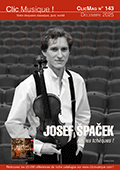|
|
|
Format : 1 CD
Durée totale : 01:01:05
Enregistrement : 22/09-08/12/2016
Lieu : Mitterretzbach
Pays : Autriche
Prise de son : Stereo
Label : Gramola
Référence : GRAM99102
EAN : 9003643991026
Code Prix : DM019A
Année d'édition : 2017
Date de sortie : 01/11/2017
Genre : Classique
|
|
 |
Henry Eccles (1652-1742)Sonate pour violon en sol mineur Johann Sebastian Bach (1685-1750)Arioso extrait de la Cantate "Ich steh mit einem Fuss im Grabe", BWV 156 Joseph Haydn (1732-1809)Parties pour contrebasse seul, extrait des symphonies n° 6 en ré majeur, Hob I "Le Matin"
n° 7 en do majeur, Hob I "Le Midi"
n° 8 en sol majeur, Hob I "Le Soir"
n° 31 en ré majeur, Hob I "Hornsignal"
n° 72 en ré majeur, Hob I "Hunt" Frédéric Chopin (1810-1849)Nocturne n° 20 en do dièse mineur, op. posth. 72 n° 2 Serge Koussevitzky (1874-1951)Andante, op. 1 n° 1 Valse miniature, op. 1 n° 2 Chanson triste, op. 2 Humoresque, op. 4 Lajos Montag (1906-1997)"Extrème" Astor Piazzolla (1921-1992)"Kicho" György Kurtág (1926-)4 "Signs, Games and Messages", pour contrebasse seul Message
Schatten
Message alia modo
Eine Botschaft an Valérie Erno Rácz, contrebasse
Veronika Trisko, piano
|
 
 “There can hardly be more intractable material for bravura passages than the double bass.” – contrasting these words by the doyen of Viennese critics, Eduard Hanslick (1825–1904), Hungary-born Ernö Racz, solo double bass player at the Lower Austrian Tonkünstler Orchestra, steals the show with his brilliant style of playing, where even the most virtuoso pieces are mastered with ease. On his latest album by the title “Viaggio nel tempo” with Veronika Trisko, piano, he presents original pieces like Extrème by Lajos Montag, short pieces by Serge Koussevitzky, Signs, Games and Messages for double bass solo by György Kurtág or the double bass solos from symphonies by Joseph Haydn, as well as arrangements like the Sonata for violin and b.c. G minor by Henry Eccles, the Arioso from the Cantata BWV 156 by J. S. Bach or the Nocturne No. 20 by Frederic Chopin. Kicho by Astor Piazzolla is dedicated to Piazzollas longtime friend and colleague Enrique “Kicho” Díaz, regarded as one of the most brilliant interpreters of the tango of his day.
 |
| . |
 |
|
|
